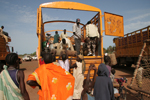
Among the mess of issues that has yet to be sorted out between the North and South Sudanese governments before the referendum is the less-talked-about conundrum of citizenship and minority rights. A field report released yesterday by Refugees International highlights this glaring problem, bringing into focus the tensions and fears felt among minority communities in Sudan that, in the case of secession, may become a catalyst for violence.
If separation should occur, the report warned, northerners in the South and especially southerners in the North are vulnerable to forced eviction, loss of citizenship, even retributive threats and violence by the two host governments.
RI estimates that between 1.5 and 2 million southerners are in the North, with about 1.3 million just in Khartoum. Many remain displaced in camps, while others have informally settled on the outskirts of society, just as others have established lives and careers in the North. These varied situations are naturally accompanied by diverse views for the future – some southerners desire citizenship in the North, while others want to return to the South as soon as possible, regardless of the availability of basic services once there.
RI’s call to action is clear. International actors must push to address the needs and rights of minority communities prior to the referendum to mitigate the tensions and unpredictability of life after. Serious engagement on citizenship negotiations between the two ruling parties can facilitate that right for those who want to stay; supporting assisted returns for those who want to go back to the South reduces the possibility of forced and immediate evictions. Securing these rights ahead of the January vote will be crucial to a peaceful referendum process.
Photo: Formerly internally displaced people offload a truck during resettlement in southern Sudan in 2007 (IRIN)

